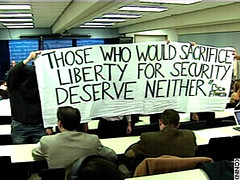CNN

I have to agree with them. I believe the NSA wiretapping oversteps the boundaries of President's office.
Attorney General Alberto Gonzales encountered angry protesters at Georgetown Law School in Washington on Tuesday as he attempted to to diffuse criticism of the National Security Agency's domestic spying program. The university was one of the stops on Gonzales' circuit as he attempts to diffuse criticism of the National Security Agency's domestic spying program.
But as the attorney general tried to convey that the extraordinary circumstances of the September 11, 2001, terror attacks justified the program, the protesters turned to one of America's Founding Fathers for their rebuttal.
"Those who would sacrifice liberty for security deserve neither" -- a paraphrase of a quote attributed to Benjamin Franklin -- had been scrawled in capital letters on a sign that required four protesters to hold it up. The thing is that once it's been done once, it's easier for the next President to do the same or even something more extreme. Once a freedom is taken from us by the Federal government it's hard as hell to get it back. This was not what the Framers intended. And before someone uses the "living breathing constitution" bull, remember that's what England had and our Forefathers wanted nothing to do with it.
The whole article is reprinted in the extended section.CNN) -- Attorney General Alberto Gonzales had trouble tapping into a group of hooded protesters at Georgetown Law School in Washington on Tuesday.
The university was one of the stops on Gonzales' circuit as he attempts to diffuse criticism of the National Security Agency's domestic spying program.
But as the attorney general tried to convey that the extraordinary circumstances of the September 11, 2001, terror attacks justified the program, the protesters turned to one of America's Founding Fathers for their rebuttal.
"Those who would sacrifice liberty for security deserve neither" -- a paraphrase of a quote attributed to Benjamin Franklin -- had been scrawled in capital letters on a sign that required four protesters to hold it up.
Gonzales didn't acknowledge the sign nor did he stop his speech as 22 protesters, including the four with the sign, stood with their backs to him during the address. Five protesters left the room during the speech. (Watch Gonzales defend the program -- 4:17)
Gonzales said that Congress was aware of the program's scope and that it had been approved "under the authorization to use military force" against terrorism.
His remarks echoed the comments of President Bush, who said Monday that he had briefed key members of Congress on the program.
Many Democrats and some Republicans have disagreed with the president's authorization of the National Security Agency to spy on U.S. citizens without a warrant.
Some lawmakers have said they weren't informed of the program's scope during briefings -- nor were they allowed to go public with concerns because of the program's sensitive nature.
The attorney general disagreed with the claim that legislators weren't told enough about the program.
"As far as I'm concerned, we have briefed the Congress," he said. "They're aware of the scope of the program."
In a speech Tuesday morning, Gonzales said the Federal Intelligence Surveillance Act, which bars wiretaps on Americans at home without a court warrant, did not prevent the NSA program.
"It is simply not the case that Congress in 1978 anticipated all the ways that the president might need to act in times of armed conflict to protect the United States," he said during his speech at Georgetown. "FISA, by its own terms, was not intended to be the last word on these critical issues."
Critics have questioned the administration's legal rationale, pointing to the 1978 FISA law, which requires executive branch agencies to get approval for domestic surveillance requests from a special court, whose proceedings are secret to protect national security.
They say the administration could accomplish the same goals legally by taking requests for warrants before the court under FISA. Even if the case is time sensitive, the act allows authorities to administer wiretaps immediately, as long as they go before the court within three days of the start of surveillance, they say.
Gonzales said warrantless wiretaps had been authorized by presidents in wartime since the Civil War.
"We have to remember that we're talking about a wartime foreign intelligence program," he said. "It is an early warning system with only one purpose: to detect and prevent the next attack on the United States from foreign agents hiding in our midst."
Earlier Tuesday on CNN, Gonzales sought to ease concerns that the program was tantamount to spying on Americans.
The program is aimed at "gathering up intelligence regarding al Qaeda," he said. "We're talking about communications where one end of the call is outside the United States and where there's a reasonable basis to believe that a person on the call is either a member of al Qaeda or affiliated with al Qaeda."
Gonzales said any member of Congress who thought the program was illegal "had an obligation" to say something publicly at the time they learned about it.
The American Civil Liberties Union and Center for Constitutional Rights filed lawsuits last week against the government to stop the program. ( Full story)
But Gonzales said he saw no reason to believe the program would raise legal issues in the administration's war on terrorism.
"I can't speak to specific cases," he said. "What I can say is we believe the program is lawful, the information was gathered in a lawful manner and will not jeopardize any ongoing cases.
On Monday, Bush told an audience at Kansas State University in Manhattan that the congressional resolution passed in the wake of the September 11 attacks that authorized the invasion of Afghanistan and other counterterrorism measures gave him the legal authority to initiate the program.
Some critics -- including former Vice President Al Gore -- call the program illegal, contending it threatens civil liberties and privacy rights.
"You know, it's amazing that people say to me, 'Well, he was just breaking the law.' If I wanted to break the law, why was I briefing Congress?" Bush said. (Full story)
"I'm mindful of your civil liberties, and so I had all kinds of lawyers review the process," he said. "We briefed members of the United States Congress."
Former NSA chief defends wiretaps
Bush reportedly authorized the NSA to intercept communications between people inside the United States, including American citizens, and terrorist suspects overseas without obtaining a court warrant.
Bush and Gonzales weren't the only officials to stand by the program Monday. In Washington, Air Force Gen. Michael Hayden, the former NSA chief when Bush first authorized the surveillance program after 9/11, staunchly came to its defense.
"Had this program been in effect prior to 9/11, it is my professional judgment that we would have detected some of the 9/11 al Qaeda operatives in the United States, and we would have identified them as such," said Hayden, who now is principal deputy director of national intelligence.
High-level administration officials are set to make public appearances about the program this week, culminating with the president's visit Wednesday to NSA headquarters outside Washington.
The attorney general also is set to appear next month before the Senate Judiciary Committee. |















Comments on "' Gonzales defends wiretaps amid protest'"
-
 David said ... (24 January, 2006 22:35) :
David said ... (24 January, 2006 22:35) :
-
 Anonymous said ... (14 March, 2007 14:33) :
Anonymous said ... (14 March, 2007 14:33) :
post a comment"Gonzales said warrantless wiretaps had been authorized by presidents in wartime since the Civil War."
This is just what I mean. Gonzales says that because it was done before it can be done now. And that the 1978 FISA law doesn't apply in this instance. BULL!
Just because Lincoln, Wilson and others spied on Americans doesn't make it right or LEGAL.
Cool blog, interesting information... Keep it UP